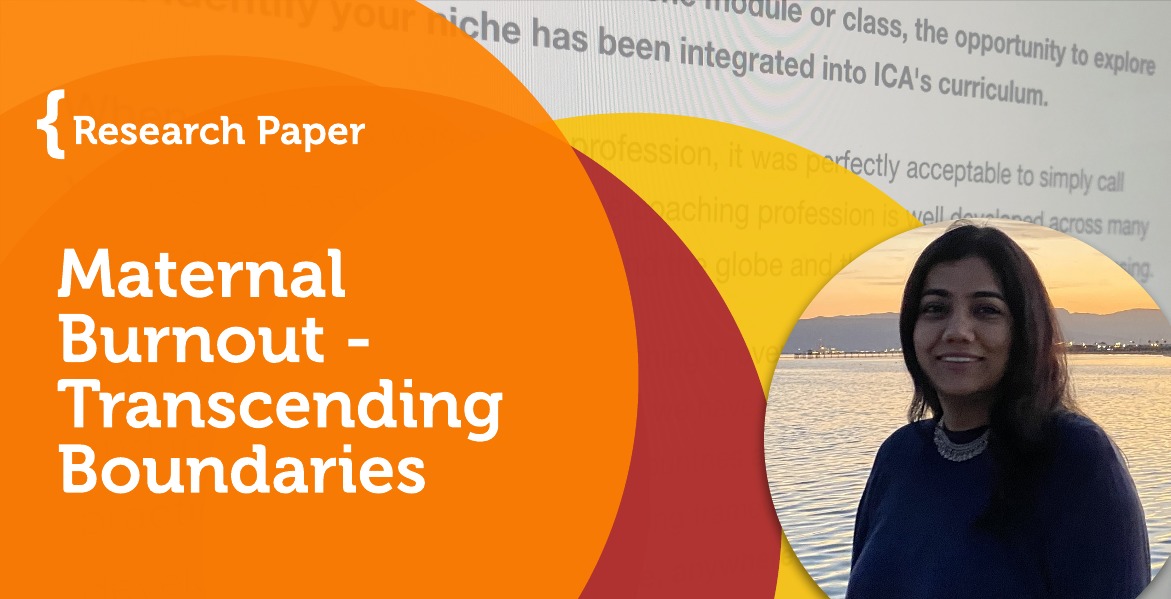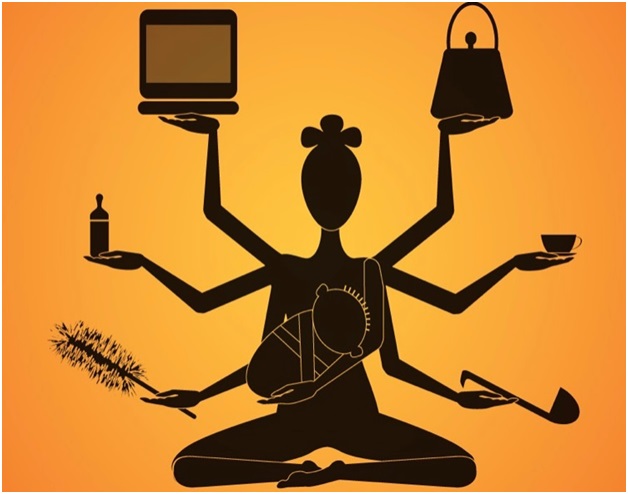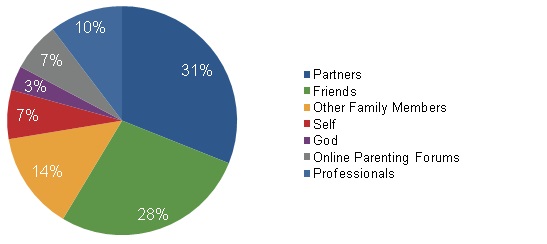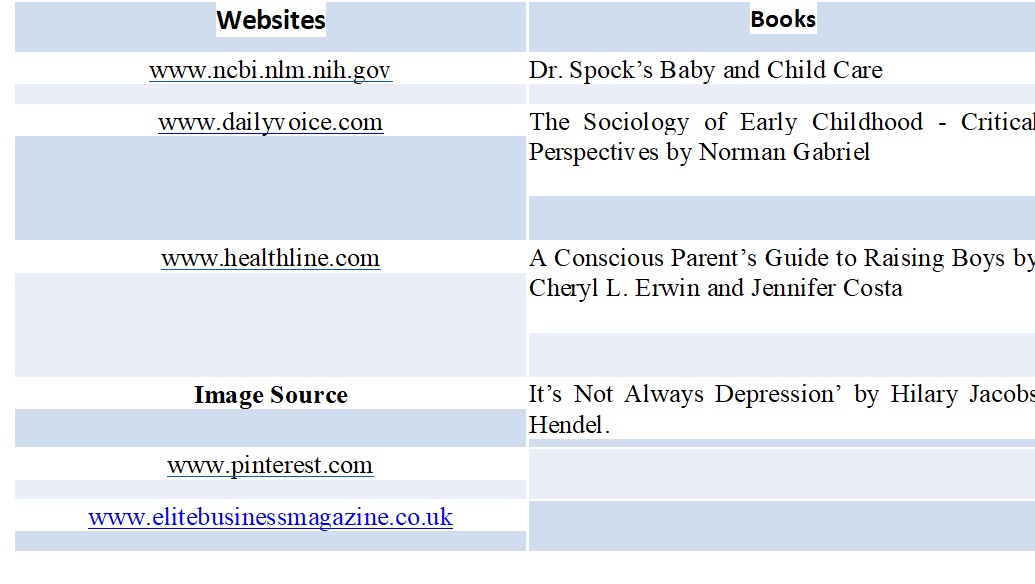 Research Paper By K.Mariam Jafri
Research Paper By K.Mariam Jafri
(Parenting Coach, INDIA)

Before becoming a parent, it’s hard to imagine just how much of paradox motherhood can be. You’ll be the happiest, and saddest you’ve ever been, you’ll be elated, infuriated, and peaceful; and that’s all before breakfast! Kear Murphy (Clinical Psychologist, mother of three)
Motherhood is an emotional roller-coaster that comes without an instruction manual. Very few women would count the physiological discomfort of pregnancy and childbirth as the most challenging part of motherhood. It is mostly what follows after; the dedication required to fulfill every need of the child, juggling with constant criticism and expectations that the society throws at you, dealing with an identity crisis, judgments, and to continue being a partner, an employee, a friend and everything else. I have met many mothers from different parts of the world. What surprises me is how little difference there is in their experience of motherhood regardless of their culture, faith, level of education, and what part of the world they come from.
I knew parental burnout was a reality, but to what extent did it affect women who happen to be the primary caregivers universally? I set out to discern this phenomenon by talking to 20 mothers from 20 different countries (from Europe, North America, Asia, and Africa). I designed a short questionnaire focusing on how women experienced motherhood, if they had ever felt burnt out and why the challenges they face, and the support they think they need.
The phenomenon of burnout refers to a specific syndrome of exhaustion related to prolonged situations of emotional imbalance, where the burden of perceived stress exceeds personal resources to cope with it. Furthermore, parental burnout is defined as exhaustion occurring as a result of being physically and emotionally overwhelmed by one’s parental role. Since my paper was focused on mothers, I prefer to call this ‘maternal burnout’.
Out of the 20 mothers I interviewed, 15 are professionally engaged. All of them have multiple children, ages of children ranging from newborn to 21 years. They all have partners and come from financially comfortable homes. Most names have been changed as the majority of the mothers preferred to stay anonymous.
The starting of this research coincided with the global lockdown of 2020. All the mothers were struggling to cope with this unprecedented situation, working harder than ever before and dealing with unforeseen challenges daily. I am extremely grateful to each one of them for investing their precious time in my research.
The Complicated Emotions of Motherhood
Whether your pregnancy was meticulously planned, medically coaxed, or happened by surprise, one thing is certain – your life will never be the same. Catherine Jones, Welsh actress, and mother of two
What are the most prominent emotions felt by mothers? The first words mentioned were love, happiness, and gratitude, and then; exhaustion, frustration, guilt, fear, and anxiety. The words happiness, love, and gratitude were mentioned 29 times, while the latter 45 times!
While motherhood can be joyous and fulfilling, it can also be emotionally and physically draining.
I was always stressed in the first years with my children because I felt I was not doing enough. Instead of accepting that I was tired, I kept pushing myself to do more and more. I put myself under so much pressure that I did not enjoy being a mother. Anonymous, Italy
I mostly have regrets. I am a working mother and I cannot spend most of the time with my children. I feel sad that I miss their special moments. They have a better relationship with their nanny than with me. It makes me sad and it also makes me angry. – Anonymous, Turkey
From what I observed, mothers were not having an easy time parenting. Was it their fault, or were their partners not supportive enough or was the society failing them? Or was it all of the above?
What is Stressful about Motherhood?
My biggest challenge every day is to be a great mother and a great businesswoman. Tory Burch, businesswoman and a mother of three.
- Expectations – From Self and Others: They were all trying to be the perfect mother through multi-tasking and trying to achieve a work-life balance with limited time and unlimited responsibilities. This came at the cost of neglecting their own basic needs of nutrition and adequate rest which eventually led to mental and physical stress.
Expectations from ourselves, from those around us and the society in general; the biggest problem is that a mother wants to be everything. Anonymous, Austria
The children have so many needs that I find it impossible to fulfill them. It’s very stressful. – Anonymous, Egypt
- Self-Doubt and Fear: I found many mothers doubting their parenting style and decisions. The fear of failing as a mother seemed to be another underlying cause of the stress that women subjected themselves to. This often led to feelings of unreasonable guilt and frustration. The fear of something unfortunate happening to the children seemed to be deeply rooted in most of the mothers I interviewed.
Will they be treated unfairly because they are girls? – Anonymous, Italy
I worry a lot! Am I screwing them up by doing or not doing something? I worry about whether I keep them safe; from others, themselves, and this mad world. I worry about whether they will make it on their own as adults or if they’ll flounder and wind up on the streets as homeless people. Just worry!- Debbie, USA
- Isolation: I, personally have never felt more isolated in my life (despite living in my own city) than I did in the first two years of being a mother. None of my other friends had children. I stopped relating to my childhood best friends because I felt they did not understand me. And these were the people I was closest to.
It can be very isolating. People should support mothers instead of telling them what to do. It’s the structural problem of the society. – Anonymous, India
- Lack of Time and Support: Striving to find time for everything important, from child care and career to social commitments and household responsibilities, often results in frustration and exhaustion. All the mothers complained of not resting enough.
There just never seems to be enough hours in the day! Hamida, Wales
I don’t sleep enough and that exhausts me and amplifies the stress. Anonymous, Ivory Coast
- Household Responsibilities: Parenting is a 24×7 job, yet women are expected to somehow continue managing the household. Less than 50% of women could rely on their husbands for support.
My husband told me that I am only a good mother. Neither am I a good wife nor a good house manager. It is said that there is no appreciation for what you give to your children. Anonymous, Turkey
Running around is exhausting! When I’m exhausted; I’m less patient, less of a good listener, just less! We turn into doers – do your homework, do your extracurricular, clean up your room, take a shower, go to bed. That’s not parenting; that’s being a warden. I don’t like that! It becomes stressful because I want them to feel loved, cared for and special – not like little prisoners. Debbie, USA
How Common are Burnouts among Mothers?
Burnout is a bone-tired, soul-tired, heart-tired kind of exhaustion. Pennebaker, American Social-Psychologist
16 out of 20 mothers (80%) experienced burnout at some stage of parenting. 13 of them felt it was completely from parenting whereas, for others, the burnout happened as a result of other factors as well.
According to recent research published inwww.dailyvoice.com ( an Americanhyperlocal news site), the root cause of parental burnout is an imbalance between the demands and rewards of parenting.
Burnouts have become a part of my life. – Carmen, Germany
Neil D. Brown (LCSW) in his book ‘Ending the Parent-Teen Control Battle’ says, “Parental burnout is a state of physical, mental, and emotional exhaustion. It leaves parents feeling chronically fatigued, often experiencing sleep and concentration problems which can lead to depression, chronic anxiety and illness.”
What Does Maternal Burnout Feel Like?
When you become a mother, you are no longer the center of your own universe. You relinquish that position to your children. Jessica Lange, American actress, and mother of three.
From crying incessantly to emotional eating, from fearing that they will never be able to sleep again to reach a point where they felt they couldn’t offer anything to anyone anymore, mothers have battled these emotions and experiences without even acknowledging them.
While one respondent suspected her hormones to be the cause of these feelings and consulted a gynecologist for her condition, another participant went to a psychologist assuming the problem was in her mind. A third mother figured out her condition much later after discussing it with a friend.
I reached the break down point where I had to be hospitalized and have blood transfusions. My body lacked nutrients, I wasn’t eating well but I kept ignoring my needs because I was only consumed with the idea that I wasn’t doing enough for my family. Anonymous, Egypt
Cooking is considered the purest form of expressing love in our culture. I realized how exhausted I was when I didn’t even have the energy to cook for my family. Anonymous, Japan
I feel exhausted and start losing my temper. Anonymous, China
Other common feelings and experiences that the mothers shared were; feeling irritable and demotivated, unable to enjoy life, falling sick often, rapid weight loss/gain, and living with the feeling that irrespective of how much they do, it’s just never enough!
The Truth Behind Maternal Burnouts
Having children just puts the whole world into perspective. Everything else just disappears. Kate Winslet, a British actress, and mother of three.
Lack of Support: The unfortunate truth is that parenting is largely considered to be a woman’s job. Motherhood in itself is not tiring, having to parent alone is. The most common reason for burnout among mothers was lack of support and empathy first and foremost by the family (partner and other family members). 9 out of 20, i.e. less than half the mothers, said they could count on their husbands for support. The partners either had very long working hours or did not offer support even when they had time. These partners have assumed the traditional role of contributing by bringing money home. However, 15 out of the 20 mothers I interviewed were professionally working mothers. This implies that even when the finances were shared, parenting responsibilities weren’t.
I wonder if it was me who started parenting alone or was I simply never offered any support. – Anonymous, Egypt
If you don’t have emotional support from your husband, you will burn out. I had to go to a psychiatrist to be sure of my stand. I was so lost. I could not think logically. No one understood my feelings. People told me that since I had two beautiful boys, what more could I possibly want? Anonymous, Turkey
Maternal Guilt: The website www.healthline.com defines maternal guilt as “that pervasive feeling of not doing enough as a parent, not doing things right, or making decisions that may ‘mess up’ your kids in the long run”. Its universality is apparent since it’s felt by both working and stay at home mothers.
A mother’s guilt is a trap that women unknowingly fall into. Unfulfilled expectations lead to guilt and frustration. These expectations could either come from within or outside i.e. family or society. Motherhood is glorified to such an extent that it tends to dehumanize women. Not sleeping for several nights, forgetting to eat, inability to take time out for social interaction, and self-care are unfortunately considered as a part and parcel of parenting for women. Yet many mothers worry and doubt themselves; “am I good enough?” or “what if everything that I am doing is wrong?”
My expectations towards myself make life as a mother challenging sometimes. I want to give each child-specific attention depending on their individual needs; quality time, affirmations, physical touch, acts of service or gifts and that is not always easy. Anonymous, Switzerland
I feel disappointment and guilt when I see my children misbehaving and being unkind. I feel it’s because I was working full time up until one year back that might have caused these issues. Anonymous, Sri Lanka
If the mother works in a professional role, she will feel she doesn’t spend enough time with her family. But the stay-at-home mums feel they are not appreciated because there is no recognition for the work they do at home. Anonymous, France
Psychotherapist and author, Hilary Jacobs Hendel refers to guilt as an inhibitory emotion that blocks our core emotions. In her book ‘It’s Not Always Depression’, she writes: “Consistently prioritizing the needs of others is not good for our mental health, nor is it good for our relationships, as it breeds resentment.”
Life with Newborns: Many mothers felt high levels of stress while caring for newborns, especially with their first child. Dr. Benjamin Spock, an American pediatrician whose book ‘Baby and Child Care’ is one of the bestselling volumes in history wrote, “She (the mother) has been through an intense physical change. If it’s her first baby, she can’t help feeling anxious. Any baby will make great demands on her strength and spirit at first. Most women need a great deal of support from their partners at this time. They need help with the care of the baby and any other children, and with housework. Even more, they need patience, understanding, appreciation, and affection.”
“Dr. John Gottman, University of Washington, has spent years studying marriage. He has found that 40-70% of all couples experience stress, conflict, and a drop in satisfaction with their relationship when a baby comes home. Why? Well, moms often provide most of the hands-on care for infants, including nursing the baby, walking the floor when he cries and getting up several times during the night. A new mother may experience postpartum depression and may have little energy for fun with her dad. Fathers, on the other hand, often report feeling excluded by the mother-and-baby duo and may find other ways of occupying themselves while their child is young. Sometimes the patterns that form during a child’s early years are difficult to change as that child grows.” – A Conscious Parent’s Guide to Raising Boys- Cheryl L. Erwin and Jennifer Costa
Postpartum was a challenge as I had to tie some loose ends at work while also recovering and caring for a newborn. Anonymous, Lebanon
I never rested even when I should have because my inner voice was telling me that mothers don’t rest. Anonymous, Italy
Balancing Household and Professional Duties: Double responsibilities imply a double amount of stress. A mother confessed she regretted working because she neither liked her work nor was she comfortable leaving her children in other people’s care. The world calls them ‘supermoms’ or ‘superwomen’, thereby acknowledging that no normal human being is capable of managing everything that is expected from a working mother.
 Society’s idea of a supermom!
Society’s idea of a supermom!
Seeing myself failing professionally gives me maximum anxiety. Anonymous, Ivory Coast
I manage everything on my own; the kids, the house, my work, drop off, pick-ups, doctors, etc. In French, it’s called, ‘la charge mentale’ or the mental load! Anonymous, France
I grew up in the countryside but now our lifestyle is very city-based. To make up for that, we have enrolled them in several activities. It gets a bit stressful. I feel like a taxi service a lot of times. Anonymous, Scotland
Sickness: When the mother is already overworked, a child’s sickness can take a toll on her health. Not only do sick children need visits to the doctor but also extra attention and care. Mothers often spend sleepless nights caring for their young ones. Saba, a mother from Pakistan, reported that she often fell sick by the time her kids recovered; from the stress and from completely ignoring her needs.
When Children are Dealing with Stress: “Emotional and situational challenges that affect my child also take an emotional toll on me because I am so connected with my kids. So it’s not just one thing – it’s a collection of reasons that leads to parental burnout.”- Debbie, USA
Having to Parent Alone: In many cases, the partner was either traveling frequently for work or was working in another country.
My husband was away for work and I was parenting my kids alone in a foreign country. Balancing chores and deadlines was so stressful that I felt I couldn’t take it anymore. Anonymous, Afghanistan
There are no parenting books on living in a pandemic. I had to move to my country without my husband and now I am the only one responsible for the children. – Anonymous, Turkey
The Support Mothers Have:
 Only 31% of mothers said they could count on their partners for support. Talking to friends and other family members were the next best option for most women.
Only 31% of mothers said they could count on their partners for support. Talking to friends and other family members were the next best option for most women.
Relying on oneself through exercise, rest, and scaling back is quite uncommon as was reaching out to professionals such as psychotherapists, coaches, and counselors.
The Support Mothers Wished They Had:
You are in a much better position to serve others when your basic needs are met and your tank is full. Michael Hyatt, Author
Professional Help: Individual/couple counseling to strengthen the relationship between partners and with children to deal with stress and burnouts, coaching and free online counseling, expert childcare and helplines to deal with stressed out and anxious mothers are some of the ways mothers thought families could be supported professionally.
Norman Gabriel in his book, The Sociology of Early Childhood, writes, “With the growing trend towards more men and women employed full-time in the workforce, a range of professionals have to be employed to care for many of our young children.”
Support from the Workplace: 75% of the mothers I surveyed worked full time professionally and felt that maternity leave and flexible work hours could help ease their pressure to a great extent.
Informal Support Groups: These can create opportunities for child support, catering to individual needs. Mothers and children with specific issues need more structured support. One mother shared her experience with churches in England where exchange evenings were organized for parents to share common challenges and they proved to be very beneficial.
I wish there was a trustworthy daycare where I could send my children for some time. I had to devote myself completely to my children and had no time for myself. Anonymous, Korea
An Empathetic Society: Parenting can be isolating. Awareness of issues like Postpartum Depression and maternal burnout could make it easy for women to reach out for help. Most importantly, we need a society that is empathetic towards mothers and does not judge them. An article on ‘Identifying Signs and Symptoms of Parental Burnout’ published by www.daily.com affirms; “there’s a stigma associated with parental burnout. As a result, parents hide what they’re going through, and don’t reach out for practical and emotional support”.
Family Friendly Public Spaces: Affordable public places where families can relax and children have the freedom to run around, without parents having to worry about their safety.
People should realize that kids are occasionally frustrating. Having time to do things apart from parenting, going in a different environment where people don’t interact with you as parents can be good ways to decompress for mothers. Julia, England
How Can Coaching Help Mothers Manage Burnouts?
Surround yourself only with people who are going to take you higher. Oprah Winfrey
The inspiration for this research came from the regrets I accumulated over the years as a mother. “I wish I knew then” came to define the subsequent stage of motherhood where I felt in better control of my time and emotions and more accepting of a flawed version of myself. I never understood why motherhood was glorified. I assume that it is society’s way to prepare women to make every sacrifice that may come in their way and put themselves last, with a smile and without complaints.
Since my coaching niche is parenting, I decided to dedicate my research paper to understand motherhood across cultures and geographical boundaries. Irrespective of differences, the struggle for mothers is the same universally. It is largely related to navigating with emotions such as fear, loneliness, and guilt, managing expectations, balancing life and work, and believing in themselves.
There is clearly a dire need for support and compassion for mothers, irrespective of the background they come from. Unfortunately, very few mothers find this support when they are at their most vulnerable. In many cases, what follows is burn out. Some of the respondents took years to recover, while others have been unable to break the cycle.
To be able to raise little humans, a mother needs to prioritize her own well-being. I believe that coaching can be an excellent service for mothers who are looking at making crucial life decisions, are struggling with parenting, or even trying to rediscover themselves. Mothers want to be heard, understood, and accepted. This is the space that coaching can offer, to listen without judgments and assumptions. Since every mother and her journey is unique, a coach can provide the right tools and resources suitable for her. A professional coach is sensitive to different cultures and contexts, to values and underlying beliefs, and can motivate the client by sharing appropriate intuitions and observations. Coaching could enable client mothers to create structures and frameworks that would support them in creating sustainable change. By offering unconditional positive regard and asking powerful questions, the coach can change disempowering feelings to empowering ones. Coaching can help mothers focus attention on themselves because unless their own cup is full, they cannot pour into others.
Parenting is a journey that no mother should have to suffer. However, a mother can only have healthy relationships with her children when she has one with herself. The safety guidelines in flights always instruct us to help ourselves first before we help others, including our children.
I do hope that the findings of this paper will help me and other coaches facilitate a helpful and rewarding journey for mothers through their difficult times.
References:
